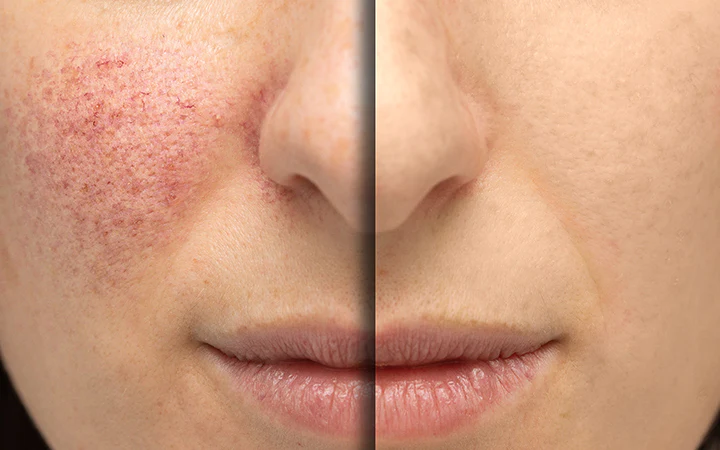Rosacea Treatment - Abu Dhabi - Dubai
Rosacea is a chronic skin condition that primarily affects the face, causing redness, flushing, visible blood vessels, and sometimes bumps or pimples. While there is no known cure for rosacea, there are various treatments available that can help manage its symptoms and reduce flare-ups. Here are some common approaches to rosacea treatment:
- 1. Medications: Topical and oral medications are often prescribed to control the signs and symptoms of rosacea. Topical medications may include antibiotics, such as metronidazole or azelaic acid, which help reduce inflammation. Oral medications, such as low-dose antibiotics (e.g., doxycycline) or isotretinoin, may be prescribed in more severe cases.
- 2. Topical creams and gels: Prescription creams and gels can be applied to the affected areas to reduce redness and inflammation. These may contain ingredients like metronidazole, azelaic acid, or brimonidine.
- 3. Laser and light therapies: Certain laser and light-based treatments can effectively target visible blood vessels and reduce redness associated with rosacea. These treatments work by destroying the blood vessels or reducing their size. Intense Pulsed Light (IPL) therapy and pulsed dye lasers (PDL) are commonly used for this purpose.
- 4. Avoiding triggers: Identifying and avoiding triggers that worsen rosacea symptoms is crucial. Common triggers include sun exposure, hot or spicy foods, alcohol, temperature extremes, and certain skincare products. Keeping a diary to track flare-ups can help identify individual triggers.
- 5. Gentle skincare routine: Using gentle, non-irritating skincare products is essential for individuals with rosacea. Avoid products that contain alcohol, fragrances, or harsh ingredients. It's also advisable to use a mild cleanser, moisturize regularly, and protect your skin from sun exposure with broad-spectrum sunscreen.
- 6. Camouflage makeup: Cosmetics can be used to conceal redness and minimize the appearance of rosacea. Look for products that are non-comedogenic, fragrance-free, and specifically formulated for sensitive skin. Green-tinted or color-correcting primers can help neutralize redness.
It's important to consult with a dermatologist or healthcare professional who specializes in skin conditions to determine the most suitable treatment options for your specific case of rosacea. They can provide an accurate diagnosis and tailor a treatment plan to manage your symptoms effectively.

